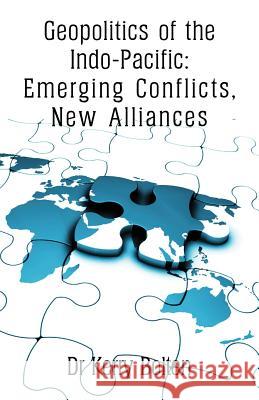Geopolitics of the Indo-Pacific » książka
Geopolitics of the Indo-Pacific
ISBN-13: 9781908476395 / Angielski / Miękka / 2013 / 208 str.
Geopolitics of the Indo-Pacific: Emerging Conflicts, New Alliances, focuses on a region that has in recent years become of vital interest to the super-powers. Dr Bolton contends that the perceptions that are common in regard to Sino-Russian accord and Sino-American animosity are erroneous, and that present alliances will collapse in the face of environmental crises, in particular a scramble for the control of water resources. The role of China's domination of Tibet is of particular interest. The economic interests of China and the USA are shown to be symbiotic and part of a long-term strategy under the auspices in particular of the Rockefeller dynasty. Russia, on the other hand, will remain in conflict with the USA unless it accedes to globalist interests, while plutocrats such as George Soros and globalist advisers such as Kissinger and Brzezinski regard China as an essential component of a 'new world order'. The crucial role of India is considered. The military confrontations of Vietnam, Russia and India with China are placed in the context of present developments, along with ongoing disputes with Japan, the Philippines and others. The conclusion is that Chinese and US hegemonic interests are detrimental to the cultural, social, economic and political well-being of the region, and that a new alliance of nations, based around an Indo-Russian axis, is the only option for resisting the subordination of the region by the USA and China.
Geopolitics of the Indo-Pacific: Emerging Conflicts, New Alliances, focuses on a region that has in recent years become of vital interest to the super-powers. Dr Bolton contends that the perceptions that are common in regard to Sino-Russian accord and Sino-American animosity are erroneous, and that present alliances will collapse in the face of environmental crises, in particular a scramble for the control of water resources. The role of Chinas domination of Tibet is of particular interest. The economic interests of China and the USA are shown to be symbiotic and part of a long-term strategy under the auspices in particular of the Rockefeller dynasty. Russia, on the other hand, will remain in conflict with the USA unless it accedes to globalist interests, while plutocrats such as George Soros and globalist advisers such as Kissinger and Brzezinski regard China as an essential component of a new world order. The crucial role of India is considered. The military confrontations of Vietnam, Russia and India with China are placed in the context of present developments, along with ongoing disputes with Japan, the Philippines and others. The conclusion is that Chinese and US hegemonic interests are detrimental to the cultural, social, economic and political well-being of the region, and that a new alliance of nations, based around an Indo-Russian axis, is the only option for resisting the subordination of the region by the USA and China.











